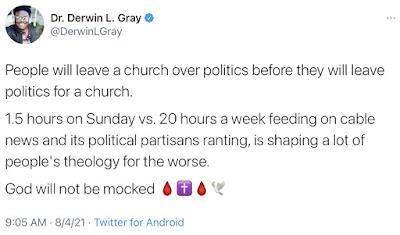I have had these three tweets from Skye Jethani rolling around in my head for a couple of weeks.

I follow Skye on Twitter because I occasionally listen to The Holy Post Podcast, which he cohosts. Even through I don't always agree with him, I do find his thoughts to be interesting.
That is how I feel about these tweets. I don't 100% agree with them, but they sure got me thinking.
The part I absolutely agree with Skye about is the need for a corporate theology. American Christianity has developed a very individualized faith. It is all about my personal relationship with God.
I have written before how we don’t just have a personal relationship with God,
but we have a covenant relationship with God. An understanding of the covenant nature of Christianity would go along way to help us grasp the truth that we are part of God’s Global Family, and that our relationship with God includes our relationships with other people.
With that being said, when it comes to the topic of masks and vaccinations more than a corporate theology we need a theology of rights.
This lack of understanding about rights is true for people inside and outside the church. We have many people who want to stand up and claim something as a right to justify what they want to do.
One of the reasons we need a proper understanding of rights is because it helps us navigate these type of conversations.
Do I have the right to choose to wear a mask or not to wear a mask?
Do I have the right to choose to be vaccinated or not to be vaccinated?
We need a way to determine if something is really a right or if we are using freedom as a justification for doing what we want to do.
A second reason why we need a proper understanding of rights is because it helps us understand the sacrifice we need to make so we can follow Jesus.
In Philippians 2:7 (NLT) we read:
Instead, he gave up his divine privileges;
he took the humble position of a slave
and was born as a human being.
Jesus gave up, in other words he sacrificed, his rights in order to save us.
Looking at this passage through the lens of rights, Jesus saw his rights as something that he could set aside in order to love his Father and to love people.
Our rights, like all of God’s blessings, are to be used for the good of His kingdom. That means there will be times when we have to set aside or sacrifice our rights in order to love people.
Remember, sacrifice is one of the primary ways we worship God.
For example, I am a big 2nd Amendment guy. I think we have the right to self-defense and to protect the lives of our family and friends. If we believe that, then we understand the sacrifice we make when we lay down our weapons for the sake of the Kingdom.
Having a proper understanding of rights allows us to have the conversation about how we properly use our rights, when we should work to protect our rights, and the when and why we should lay them down to follow the example Jesus.
Here is the bottom-line: A proper understanding of our rights helps us know when a sacrifice of our rights is needed in order to love people.
When it comes to these questions about masks and vaccinations here are a couple of thoughts I have.
It doesn’t matter what your position on masks are, whether they are effective or not, it is not a violation of your rights to wear a mask to spend time with a person who is more concerned about COVID than you are. In fact, wearing a masking is the loving thing to do because it is taking in to consideration the other person’s thoughts and feelings.
When it comes to vaccinations I think things are a little different.
God created us to be good stewards, and being good stewards includes taking good care of our bodies. I don’t think it is wise or loving to tell a person unsure of the health benefits of a vaccine that they need to be vaccinated in order to show love to other people. This is especially true since there are other ways for a person to protect others, like practicing good hygiene and staying home when you are sick.
Therefore, as long as a person is practicing good hygiene and staying home when not feeling well, they are not violating the command to “love your neighbor,” because they are doing other things to keep themselves and other people healthy.
Having a good theology of rights would help us know the proper use of our individual rights and us understand when to sacrifice those rights so we can love our neighbor.





















